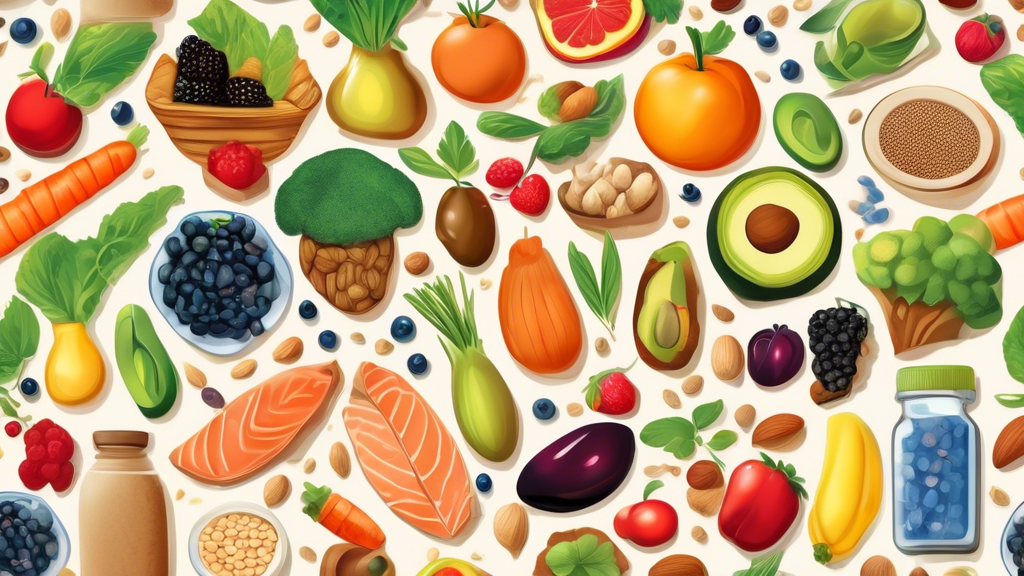
Top Foods Scientists Recommend for a Healthy Diet
Share
Introduction to a Balanced Diet
A healthy diet is essential for maintaining overall well-being and preventing chronic diseases. Scientists have extensively researched the benefits of various foods, discovering that certain items stand out due to their high nutrient content and health benefits. Incorporating these foods into your daily meals can significantly impact your health in the long run. This article highlights the top foods that scientists recommend for a healthy diet.
Fruits and Vegetables: Nature's Nutrient Powerhouses
Berries: Antioxidant-Rich and Delicious
Berries, including blueberries, strawberries, raspberries, and blackberries, are packed with antioxidants, vitamins, and fiber. These tiny fruits are known for their ability to combat oxidative stress, reduce inflammation, and support heart health. Regular consumption of berries can also improve cognitive function and protect against certain types of cancer.
Leafy Greens: The Ultimate Superfoods
Leafy greens such as spinach, kale, and Swiss chard are low in calories but high in essential nutrients like vitamins A, C, K, and folate. These vegetables also provide a good amount of iron and calcium. Incorporating a variety of leafy greens into your diet can help lower the risk of chronic diseases and improve gut health due to their high fiber content.
Citrus Fruits: Immune System Boosters
Citrus fruits such as oranges, lemons, limes, and grapefruits are well known for their high vitamin C content. Vitamin C is crucial for a robust immune system, collagen production, and the absorption of iron from plant-based foods. Additionally, citrus fruits contain flavonoids that have anti-inflammatory and antioxidant properties.
Whole Grains: A Staple for Sustained Energy
Oats: Heart-Healthy and Satisfying
Oats are an excellent source of soluble fiber, particularly beta-glucan, which helps lower cholesterol levels and regulate blood sugar. They provide sustained energy and keep you feeling full for a longer time. Oats can be enjoyed in various forms, such as oatmeal, granola, or oat-based snacks.
Quinoa: A Complete Protein
Quinoa is a versatile grain that contains all nine essential amino acids, making it a complete protein source. It is also rich in fiber, magnesium, B vitamins, and antioxidants. Including quinoa in your meals can improve overall nutrient intake and support muscle health.
Proteins: Building Blocks for the Body
Fatty Fish: Omega-3 and Beyond
Fatty fish such as salmon, mackerel, sardines, and trout are high in omega-3 fatty acids, which play a crucial role in brain function, reducing inflammation, and supporting heart health. Omega-3s have also been linked to lower risks of depression and improved vision.
Legumes: Plant-Based Protein Power
Legumes, including beans, lentils, and chickpeas, are excellent sources of plant-based protein, fiber, iron, and folate. They are particularly beneficial for vegetarians and vegans looking to meet their protein needs. Legumes are also low in fat and can help regulate blood sugar levels.
Eggs: Nutrient-Dense and Versatile
Eggs are an affordable source of high-quality protein and contain various essential nutrients, including vitamins B12, D, E, and choline. Despite previous concerns about cholesterol, moderate egg consumption is generally considered safe for most people and can contribute to a balanced diet.
Nuts and Seeds: Small but Mighty
Almonds: Heart-Healthy and Protein-Rich
Almonds are rich in healthy monounsaturated fats, protein, and fiber. They also provide vitamin E, magnesium, and antioxidants. Studies have shown that regular consumption of almonds can improve heart health, aid in weight management, and reduce the risk of type 2 diabetes.
Chia Seeds: Nutrient-Dense and Versatile
Chia seeds are packed with omega-3 fatty acids, fiber, protein, and various micronutrients. They can be easily incorporated into a variety of dishes, including smoothies, yogurt, and baked goods. Chia seeds have been shown to improve digestion, support cardiovascular health, and aid in weight loss.
Dairy and Alternatives: Bone and Gut Health Essentials
Greek Yogurt: Probiotic-Rich and Protein-Packed
Greek yogurt is an excellent source of protein, calcium, and probiotics, which are beneficial for gut health. The probiotics help maintain a healthy balance of gut bacteria, which can improve digestion and boost the immune system. Greek yogurt can be enjoyed on its own or used as a base for smoothies and parfaits.
Plant-Based Milk: A Versatile Alternative
For those who are lactose intolerant or prefer a dairy-free diet, plant-based milks such as almond, soy, and oat milk offer a nutritious alternative. These milks are often fortified with vitamins and minerals like calcium and vitamin D, making them a good choice for maintaining bone health.
Herbs and Spices: Small Additions, Big Benefits
Turmeric: Anti-Inflammatory Wonder
Turmeric contains curcumin, a compound with potent anti-inflammatory and antioxidant properties. Consuming turmeric can help reduce inflammation, improve brain function, and even fight depression. Curcumin absorbs best when paired with black pepper, so consider adding a dash of both to your dishes.
Garlic: Heart Health Hero
Garlic is known for its ability to boost the immune system, lower blood pressure, and improve cholesterol levels. The sulfur compounds in garlic, such as allicin, have powerful biological effects that can contribute to improved heart health and overall longevity.
Conclusion: The Road to a Healthier You
Incorporating these top foods into your diet can pave the way for a healthier and more balanced lifestyle. Remember, the key to a healthy diet is variety and moderation, ensuring you get a wide range of nutrients to support your body's needs. For more information on the benefits of these foods and how to include them in your diet, you can visit reputable sources such as the Harvard T.H. Chan School of Public Health.
By making informed food choices and adopting healthy eating habits, you can significantly improve your quality of life and reduce the risk of chronic diseases. Start today and enjoy the journey to a healthier you!
